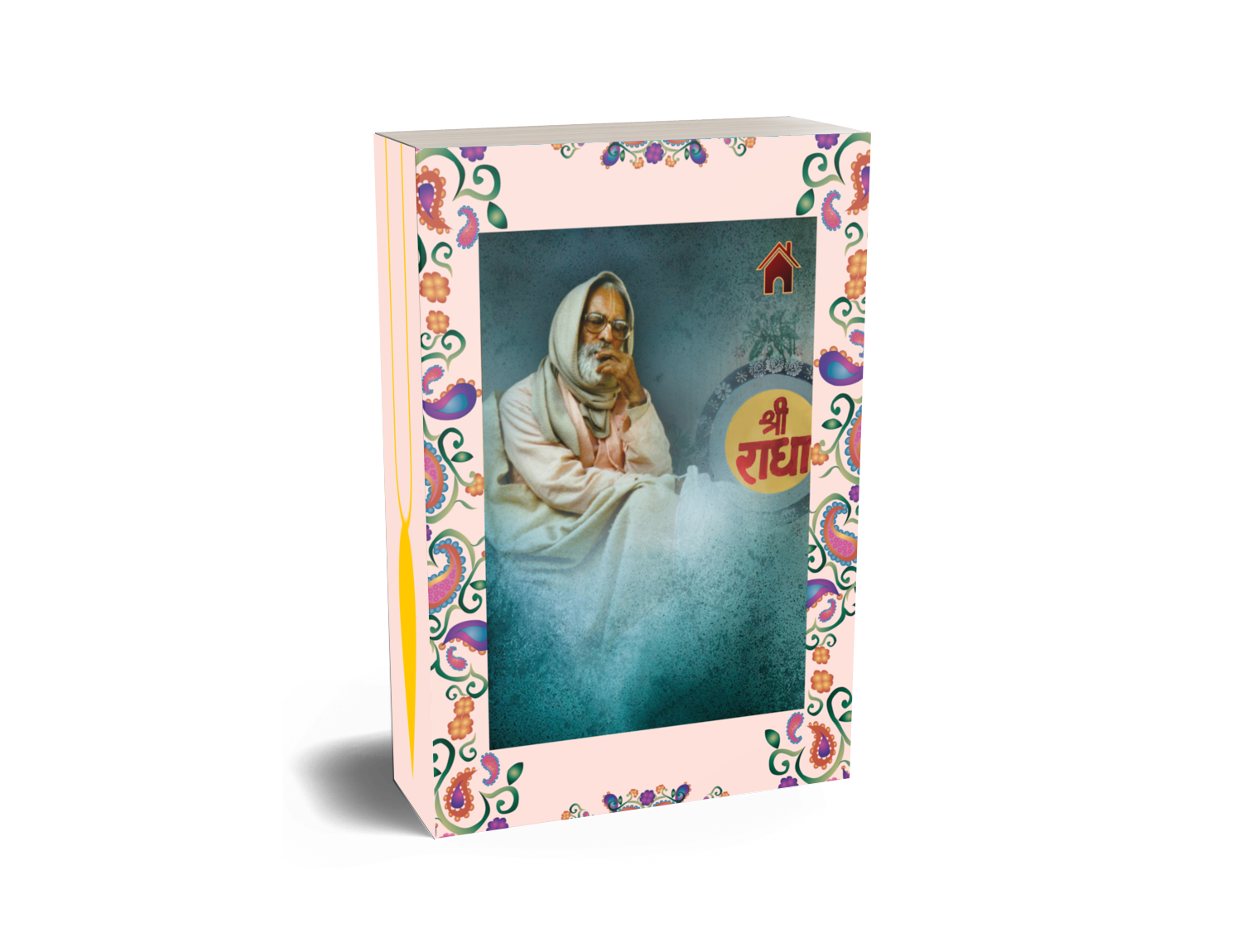

Chapter Three from the book, Bhakti-rasāyana, 4th edition by Śrīla Bhaktivedānta Nārāyaṇa Mahārāja
In the next verse the gopīs glorify Govardhana Hill, which is not only the crown of Vṛndāvana, but the crown of the entire universe.
hantāyam adrir abalā hari-dāsa-varyo
yad rāma-kṛṣṇa-caraṇa-sparaśa-pramodaḥ
mānaṁ tanoti saha-go-gaṇayos tayor yat
pānīya-sūyavasa-kandara-kandamūlaiḥ
Śrīmad-Bhāgavatam (10.21.18); Bṛhad-bhāgavatāmṛta (2.7.109)
This Govardhana Hill is the best of all those who are known as hari-dāsa because he is feeling great jubilation from the touch of the lotus feet of Kṛṣṇa and Balarāma. With great respect Govardhana is worshipping them by providing all their necessities such as caves, fruits, flowers and water for their pleasure, and for the pleasure of their cowherd friends, cows and calves.
Vṛndāvana is glorious because there Kṛṣṇa is playing the flute in the meadows of Govardhana and the 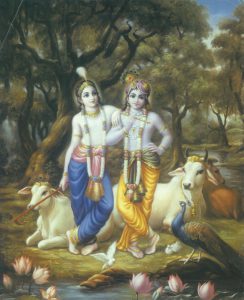 peacocks are dancing, and becoming stunned, all of the birds and animals are listening and watching. The gopīs say hantāyam, which means they are expressing their feelings of sorrow, yet there is so much ānanda in it. They are disappointed because they cannot have darśana of Kṛṣṇa and externally join in the festivities, yet they are feeling increasing ecstasy as they experience it all internally within their meditation. “We are abalā, devoid of strength. Why? The female deer go near Kṛṣṇa with their husbands following behind them, and there is nothing in this world to restrict them. But for us, everyone is an obstacle – our husbands, mothers-in-law, fathers-in-law, brothers and friends. And what is the greatest obstacle of all? The restrictions that exist in our own minds: our fear of being disgraced in society. Therefore we are abalā.”
peacocks are dancing, and becoming stunned, all of the birds and animals are listening and watching. The gopīs say hantāyam, which means they are expressing their feelings of sorrow, yet there is so much ānanda in it. They are disappointed because they cannot have darśana of Kṛṣṇa and externally join in the festivities, yet they are feeling increasing ecstasy as they experience it all internally within their meditation. “We are abalā, devoid of strength. Why? The female deer go near Kṛṣṇa with their husbands following behind them, and there is nothing in this world to restrict them. But for us, everyone is an obstacle – our husbands, mothers-in-law, fathers-in-law, brothers and friends. And what is the greatest obstacle of all? The restrictions that exist in our own minds: our fear of being disgraced in society. Therefore we are abalā.”
Prema-bhakti is something that is anugatya – without the mercy of the spiritual master, it can never be attained.
śrī-guru-caraṇa-padma, kevala-bhakati-sadma,
vando mui sāvadhāna-mate
The lotus feet of the guru are the sadma, the shelter, for that śrī, the prema-bhakti for Kṛṣṇa, which exists in the 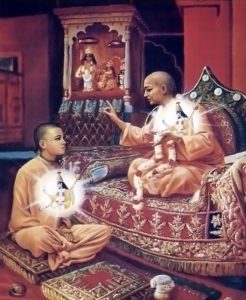 heart of that guru. This is its source. If one does not have devotion for the spiritual master, does not serve him and is not surrendered to him in all respects, then bhakti will never come. Unless one attains his mercy, one will never experience bhakti and will never receive darśana of Kṛṣṇa. Therefore here the gopīs are saying, “Sakhī, for a long time we have been desiring to meet with Kṛṣṇa, but our feet are unable to go there, our eyes are unable to see Him and our hands are unable to touch Him. In our helpless condition we cannot attain His darśana. The birds and the deer and everyone else are allowed to receive His touch and serve Him, but we are not. However, nearby is Girirāja, who is hari-dāsa-varya – the best servant of Hari – and he is guru. If we surrender to him, if we go to him and offer pūjā to him and serve him, then certainly we will receive the good opportunity to serve Kṛṣṇa.” This is the nature of the spiritual master:
heart of that guru. This is its source. If one does not have devotion for the spiritual master, does not serve him and is not surrendered to him in all respects, then bhakti will never come. Unless one attains his mercy, one will never experience bhakti and will never receive darśana of Kṛṣṇa. Therefore here the gopīs are saying, “Sakhī, for a long time we have been desiring to meet with Kṛṣṇa, but our feet are unable to go there, our eyes are unable to see Him and our hands are unable to touch Him. In our helpless condition we cannot attain His darśana. The birds and the deer and everyone else are allowed to receive His touch and serve Him, but we are not. However, nearby is Girirāja, who is hari-dāsa-varya – the best servant of Hari – and he is guru. If we surrender to him, if we go to him and offer pūjā to him and serve him, then certainly we will receive the good opportunity to serve Kṛṣṇa.” This is the nature of the spiritual master:
sākṣād-dharitvena samasta-śāstrair
uktas tathā bhāvyata eva sadbhiḥ
kintu prabhor yaḥ priya eva tasya
vande guroḥ śrī-caraṇāravindam
Śrī Gurvaṣṭaka (7)
The guru is the one who is especially dear to Kṛṣṇa. All jīvas are dear to Him, yet by serving and receiving the mercy of such a guru who can actually overpower Kṛṣṇa by prema, we can meet Him; otherwise we can’t meet Him. All devotees performing circumambulation (parikramā) of Govardhana should visit the temple of Harideva. If one performs the entire Govardhana parikramā without first taking darśana of Harideva, then he will not receive the full benefit of his parikramā. So the gopīs are saying, “On the pretext of bathing in Mānasī-gaṅgā, we will first take darśana of Harideva, and then we will go to Girirāja-Govardhana, where the desires of our hearts will be completely fulfilled. Our desires will be completely fulfilled because somewhere on top of Govardhana, Kṛṣṇa is taking the cows to graze and playing with His friends. There we will be able to receive His darśana, to receive His touch and to freely mix with Him – this is the main objective of our lives.”
This should also be the main objective of our lives. Meeting Kṛṣṇa and attaining Kṛṣṇa’s service – solely for this purpose we are practising sādhana. Ultimately the sādhana (practice) and sādhya (goal) of bhakti are one and the same. For instance there is śravaṇa, hearing – what will we hear? The science of the Supreme Lord (bhagavat-tattva), and especially the nature of the illusory energy (māyā-tattva) we must understand well: “That which we are seeing now and which we are attached to due to our selfishness will only bring us unhappiness.” Until we surrender to the feet of the spiritual master and follow the sādhana that he prescribes, we are just following the advice given to us by our own minds. When we take exclusive shelter of the guru, he will save us 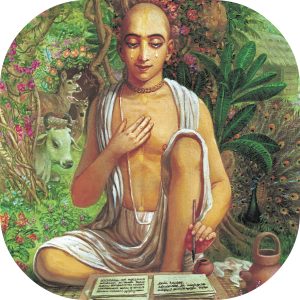 from our own independence. Then we should empty our hearts completely and accept the spiritual master’s order and act accordingly. We must make our hearts one with guru and the Vaiṣṇavas, and one with our previous ācāryas like Śrīla Viśvanātha Cakravartī Ṭhākura, Śrīla Bhaktivinoda Ṭhākura and Śrīla Bhaktisiddhānta Sarasvatī Prabhupāda. If we keep our hearts separate from them, then māyā will certainly snatch us. If we don’t surrender our independence to them, then we will only act according to our own desire. We should depend solely on them: “As they instruct me, I will do. I will apply all of my intelligence to carry out their orders.” Then we will be successful; otherwise bhakti, which is fully spiritual and has its own independent nature, will not come easily.
from our own independence. Then we should empty our hearts completely and accept the spiritual master’s order and act accordingly. We must make our hearts one with guru and the Vaiṣṇavas, and one with our previous ācāryas like Śrīla Viśvanātha Cakravartī Ṭhākura, Śrīla Bhaktivinoda Ṭhākura and Śrīla Bhaktisiddhānta Sarasvatī Prabhupāda. If we keep our hearts separate from them, then māyā will certainly snatch us. If we don’t surrender our independence to them, then we will only act according to our own desire. We should depend solely on them: “As they instruct me, I will do. I will apply all of my intelligence to carry out their orders.” Then we will be successful; otherwise bhakti, which is fully spiritual and has its own independent nature, will not come easily.
Therefore here the gopīs are saying, “By thousands of our own efforts we will never overcome the obstacles that prevent us from meeting Kṛṣṇa, such as fear of our elders and adherence to the regulations of varṇāśrama-dharma. They will only be overcome when we attain the mercy of Girirāja.” And those of us in the stage of sādhana should never leave the company of that Vaiṣṇava who is actually qualified to be followed. So many distractions may come, but we should never leave him – this is instruction number one. According to his desire we will move, and then we will surely progress upwards in the kingdom of bhajana. But if we listen instead to the dictates of our minds, we will descend into the hell known as Rasātala. What kind of things does the mind tell us? “Look, take good care of your body. Remain comfortable, and endeavour only for that happiness which is easily obtained.” And following these instructions we will become trapped in the reactions to our enjoyment, and suffer. Therefore instead we should honour the instructions of the spiritual master, the Vaiṣṇavas and the scriptures. Like the gopīs are saying in this verse, we are abalā – we have no vitality in our association with sādhus. If we are living in a temple but we never speak to anyone, and we don’t have love for both the guru and other Vaiṣṇavas, then what will happen? We will become isolated and discouraged. Lovingly we should speak with them, ask questions, attentively listen to the answers, and have a mood of affectionate reciprocation with them in all respects. Without them, we are abalā – we have no spiritual strength.
prācīnānāṁ bhajanam atulaṁ duṣkaraṁ śṛṇvato me
nairāśyena jvalati hṛdayaṁ bhakti-leśālasasya
Stava-mālā
How did previous great personalities obtain their most cherished objectives? For sixty thousand years Kaśyapa Ṛṣi and Aditi stood on their hands and went without eating, drinking and even breathing. After they performed such severe austerities, Nārāyaṇa appeared and offered them a boon. Kaśyapa Ṛṣi said, “We desire a son like you, we desire a son like you, we desire a son like you.” Nārāyaṇa replied, “Where will you get a son like me? Therefore I myself will come as your son.” And because he had asked three times, Nārāyaṇa became their son 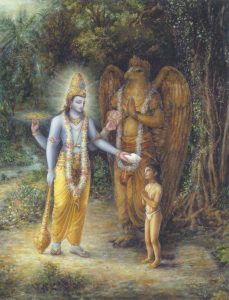 in three separate births. We can see what severe austerities Hiraṇyakaśipu performed to obtain only material things. For acquiring his own planet, Dhruva Mahārāja performed very severe austerities. Someone offered Sanātana Gosvāmī a quilt, but fearing that it may make him sleep more, he said, “Burn it!” But on the contrary, what are we doing? With great pleasure all day we are eating, sleeping, joking, laughing, quarrelling and in the midst of all this we chant a little harināma. Relatively easily we can rid ourselves of our worldly attachments, but that rare prema which we are aspiring for will not come if we are going on like this. We must have great eagerness, always thinking, “How will I meet Kṛṣṇa?”
in three separate births. We can see what severe austerities Hiraṇyakaśipu performed to obtain only material things. For acquiring his own planet, Dhruva Mahārāja performed very severe austerities. Someone offered Sanātana Gosvāmī a quilt, but fearing that it may make him sleep more, he said, “Burn it!” But on the contrary, what are we doing? With great pleasure all day we are eating, sleeping, joking, laughing, quarrelling and in the midst of all this we chant a little harināma. Relatively easily we can rid ourselves of our worldly attachments, but that rare prema which we are aspiring for will not come if we are going on like this. We must have great eagerness, always thinking, “How will I meet Kṛṣṇa?”
Once Bhagavān gave Nārada his darśana and then immediately disappeared, and Nārada began crying profusely. Why did he disappear? “Inside you there is not sufficient eagerness; therefore I have come to increase your eagerness for attaining my association. In your present form you cannot always remain with me, but when your eagerness to be with me becomes sufficiently intense, you will automatically shed your present body, and then you will always be able to see me.” But our bhajana is not filled with eagerness and intensity. If our hearts are not completely melted we will never meet Kṛṣṇa, so there is only one hope: “We are standing on the shores of the ocean of Your kindness, and if even one drop of that ocean falls upon us, then our lives will become meaningful.” Our only hope is that sometime or other we will meet Him.
Therefore if we are fortunate enough to acquire the company of a real Vaiṣṇava, we should stay with him and adopt his ways, hoping that one day we will receive the direct mercy of Kṛṣṇa. The gopīs are saying, “We are abalā because our feet are unable to take us to Kṛṣṇa. Thousands of people will see us and say, ‘Where are you going?’ Or they will say to our parents, ‘Where is your daughter going? She has become a disgrace to your  family!’” It is like this in modern times also when a family member begins to engage in bhajana. If a son or daughter drinks and smokes, goes to the cinema, and keeps illicit connections with the opposite sex, then the family members think nothing of it. But if someone leaves everything for bhajana, they say that he or she has become a disgrace to the family. If a sādhu hears about this, what will he say? “Because he has taken up bhajana, he has become the lamp-light of the family.” And hearing of this, that person’s forefathers, whether they are in Pitṛloka or wherever, will begin dancing: “Now a devotee has appeared in our family!”
family!’” It is like this in modern times also when a family member begins to engage in bhajana. If a son or daughter drinks and smokes, goes to the cinema, and keeps illicit connections with the opposite sex, then the family members think nothing of it. But if someone leaves everything for bhajana, they say that he or she has become a disgrace to the family. If a sādhu hears about this, what will he say? “Because he has taken up bhajana, he has become the lamp-light of the family.” And hearing of this, that person’s forefathers, whether they are in Pitṛloka or wherever, will begin dancing: “Now a devotee has appeared in our family!”
The gopīs are saying hari-dāsa-varyaḥ – Govardhana is the best servant of Hari. He in whom Kṛṣṇa invests all of His good qualities is called a devotee of Bhagavān, and that person is hari-dāsa. Three personalities have been referred to as hari-dāsa: Yudhiṣṭhira Mahārāja, Śrī Uddhava and Girirāja-Govardhana. Yudhiṣṭhira Mahārāja has three types of relationships with Kṛṣṇa: in vātsalya-bhāva, sakhya-bhāva and dāsya-bhāva. He serves Kṛṣṇa in these three sentiments, according to the necessity. He loves Kṛṣṇa in the same way as he does Arjuna and Sahadeva, as a younger brother. As Kṛṣṇa’s friend he jokes and laughs with Him. And by considering that everything he possesses – his kingdom, wealth, wife, sons – is for the service of Kṛṣṇa, he acts as His servant. After Kṛṣṇa had left Hastināpura, Yudhiṣṭhira Mahārāja felt that his kingdom no longer had any value, but as long as Kṛṣṇa was present there, he felt that all of his property was for the service of Kṛṣṇa. Whenever Kṛṣṇa desired to leave there and go to Dvārakā, Yudhiṣṭhira Mahārāja would approach Kuntī and say, “My dear mother, He will not listen to me, but He will listen to you. Please speak with Him.” To Draupadī he would say, “He won’t listen to me, so you just let some tears fall from your eyes. He won’t listen to me because I won’t cry, but by crying a little you will capture Him.” Then because she started crying, and 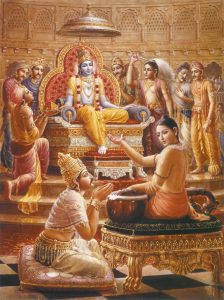 Kuntī cried also, Kṛṣṇa would not go. In this way, sometimes implementing some trickery, he would serve Kṛṣṇa. Even rasika Vaiṣṇavas like Nārada pray to Yudhiṣṭhira Mahārāja, “You are hari-dāsa. Accompanied by His queens, Kṛṣṇa comes to your palace, and so many sādhus also come. The sādhus come because they want to experience the glories of Kṛṣṇa, but I have not come for that reason. I have come for your darśana; your prema is so elevated that it even overpowers Kṛṣṇa.”
Kuntī cried also, Kṛṣṇa would not go. In this way, sometimes implementing some trickery, he would serve Kṛṣṇa. Even rasika Vaiṣṇavas like Nārada pray to Yudhiṣṭhira Mahārāja, “You are hari-dāsa. Accompanied by His queens, Kṛṣṇa comes to your palace, and so many sādhus also come. The sādhus come because they want to experience the glories of Kṛṣṇa, but I have not come for that reason. I have come for your darśana; your prema is so elevated that it even overpowers Kṛṣṇa.”
Uddhava is Kṛṣṇa’s minister, friend and servant, and he even performed the function of a priya-narma-sakhā when he delivered a message from Kṛṣṇa to the gopīs. There is pūrṇa (complete), which is Yudhiṣṭhira Mahārāja, pūrṇatara (more complete), which is Uddhava, and pūrṇatama (most complete), which is Girirāja-Govardhana. In whichever rasa Kṛṣṇa desires to enjoy, Girirāja-Govardhana is ready to serve Him. In the śānta-, dāsya-, sakhya-, vātsalya-, mādhurya– and sumādhurya-rasas, Govardhana makes the suitable arrangement for Kṛṣṇa, and is therefore known as the best of those who are hari-dāsa. Knowing this, the gopīs are saying here, “We will go to Girirāja, offer pūjā to Him and serve Him, and then we will attain darśana of Kṛṣṇa taking the cows out to graze.”
In his commentary on this verse, Sanātana Gosvāmī explains that the gopīs were thinking, “We have no strength when it comes to tolerating all of the obstacles that prevent us from meeting Kṛṣṇa. We are sitting in our homes, and if any other disturbance comes, we can hold our patience; but for meeting Kṛṣṇa we cannot hold our patience. But if we were to abandon it, what would happen? All would be destroyed for us. We know that Kṛṣṇa has taken the cows out to graze, yet for us to go there would not be proper. If we were to go, then our mothers-in-law, fathers-in-law and all the people of the village would criticise us. Therefore we are holding our patience. If we have any hope of ever receiving the company of Kṛṣṇa, our fear of being disgraced in society, our fear of our elders, and our fear of transgressing our dharma must remain. Therefore we are abalā – we cannot abandon our patience; we don’t possess the strength to do it. We are unable to go there.”
In this world also these considerations exist. One would be afraid of the reaction in society if he were to leave his home, wife, children and job to engage in bhajana. In our kṛṣṇa-bhajana, our lack of strength is also an obstacle. We are very lazy, and we are always thinking of our bodily comfort. And especially those who are householders have so many responsibilities to society and to their families that obstruct them.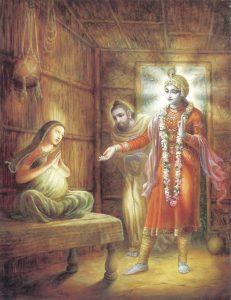
Soon after taking birth, Śukadeva Gosvāmī left his home and entered the jungle. His father Vyāsadeva was left crying, “My dear son! My dear son!” but Śukadeva didn’t answer him. Who answered him? Only the echo of the forest; his call didn’t even reach his son’s ears. If not today, then tomorrow or the next day our eagerness for kṛṣṇa-bhajana should be like Śukadeva’s, and then all of our abalā sentiments will go far away. When we really desire to overcome all of the obstacles to our bhajana, where will we get the strength to do so? The gopīs are saying, “For this we will go to Girirāja-Govardhana, because He is the best servant of Hari. Why? Because He doesn’t just serve Kṛṣṇa, but mānaṁ tanoti saha-go-gaṇayos tayor yat – Kṛṣṇa has so many companions, and he serves all of them as well. He provides pure and fragrant water for the cows and sakhās to drink, and for washing Kṛṣṇa’s feet.”
By providing all necessities, Girirāja-Govardhana would offer respect not only to Kṛṣṇa, but to His companions as well. Many people are engaged in serving the spiritual master, but few offer respect to the servants of the guru; but when one performs the service of respecting the guru’s servants, the guru is even more pleased. Similarly many devotees are serving Kṛṣṇa, but if someone serves Kṛṣṇa’s devotees and pleases them, then automatically Kṛṣṇa will be pleased. Govardhana not only provides pure water, but beautiful, soft grass as well. Eating this grass, the cows become strong and give ample milk  which satisfies Kṛṣṇa. And for the sakhās Govardhana provides not only water, but all kinds of fruits, which simply upon being seen increase their happiness: bananas, lemons, pomegranates, coconut and tāla, which is especially fragrant.
which satisfies Kṛṣṇa. And for the sakhās Govardhana provides not only water, but all kinds of fruits, which simply upon being seen increase their happiness: bananas, lemons, pomegranates, coconut and tāla, which is especially fragrant.
Govardhana also provided caves for the sakhās when they became tired from tending the cows. On hot days the caves would be cooling, and on cold days they gave warmth, and within these caves were kuñjas with mirrors composed of jewels where one could see his reflection. All materials for decorating oneself and others were available there, and in this way it also became a meeting place for Kṛṣṇa and the gopīs. Nearby are such places as Dāna-ghāṭī and Dāna-nivartana-kuṇḍa, where Kṛṣṇa and Rādhikā and Her sakhīs took taxes from one another. So the gopīs are praying, “O Girirāja-Govardhana, You are a witness to all of Kṛṣṇa’s pastimes; please give us a place from where we can also witness His pastimes.”
Hearing these words of the gopīs, a sādhaka’s hankering will increase and he will think, “When will such a day be mine, when I can go to Girirāja-Govardhana with these sentiments of the gopīs flowing in my heart? I also desire to witness Kṛṣṇa’s pastimes during the day.” This desire is the aim and objective of our lives, and the very pinnacle of bhajana.
Image/Art made possible by Pixabay.com & Krishnapath.org








